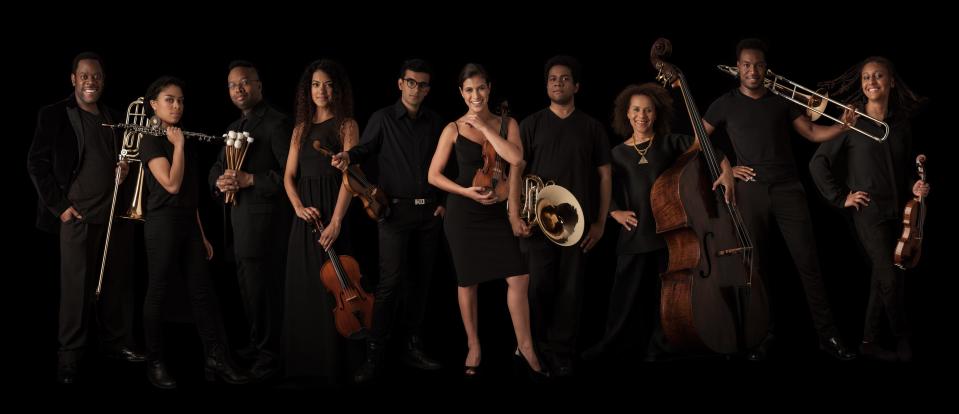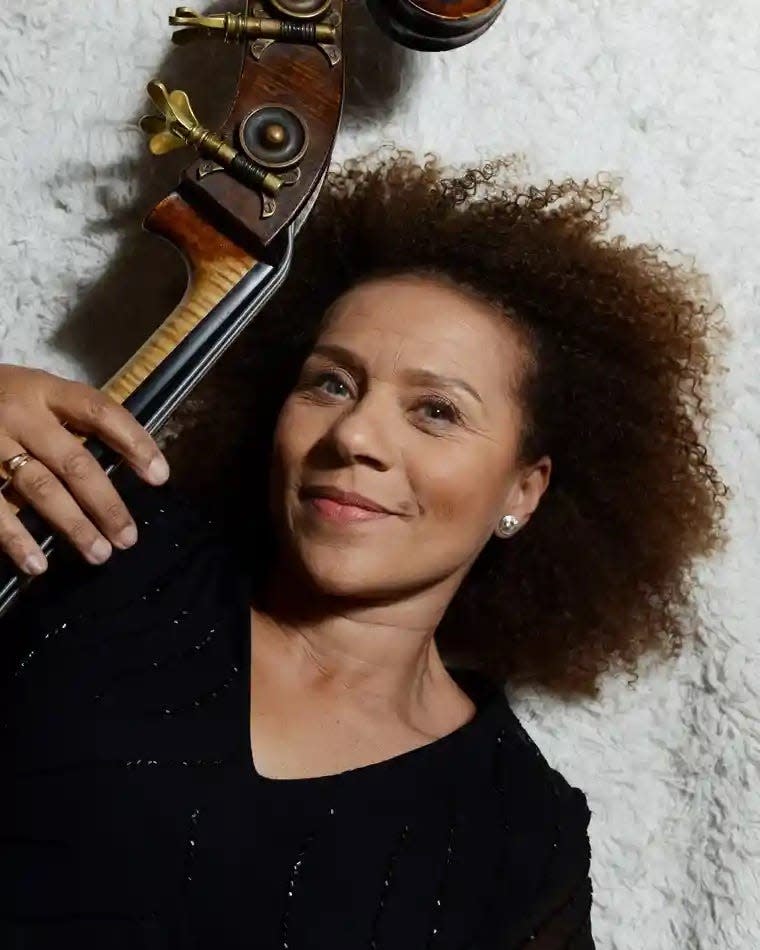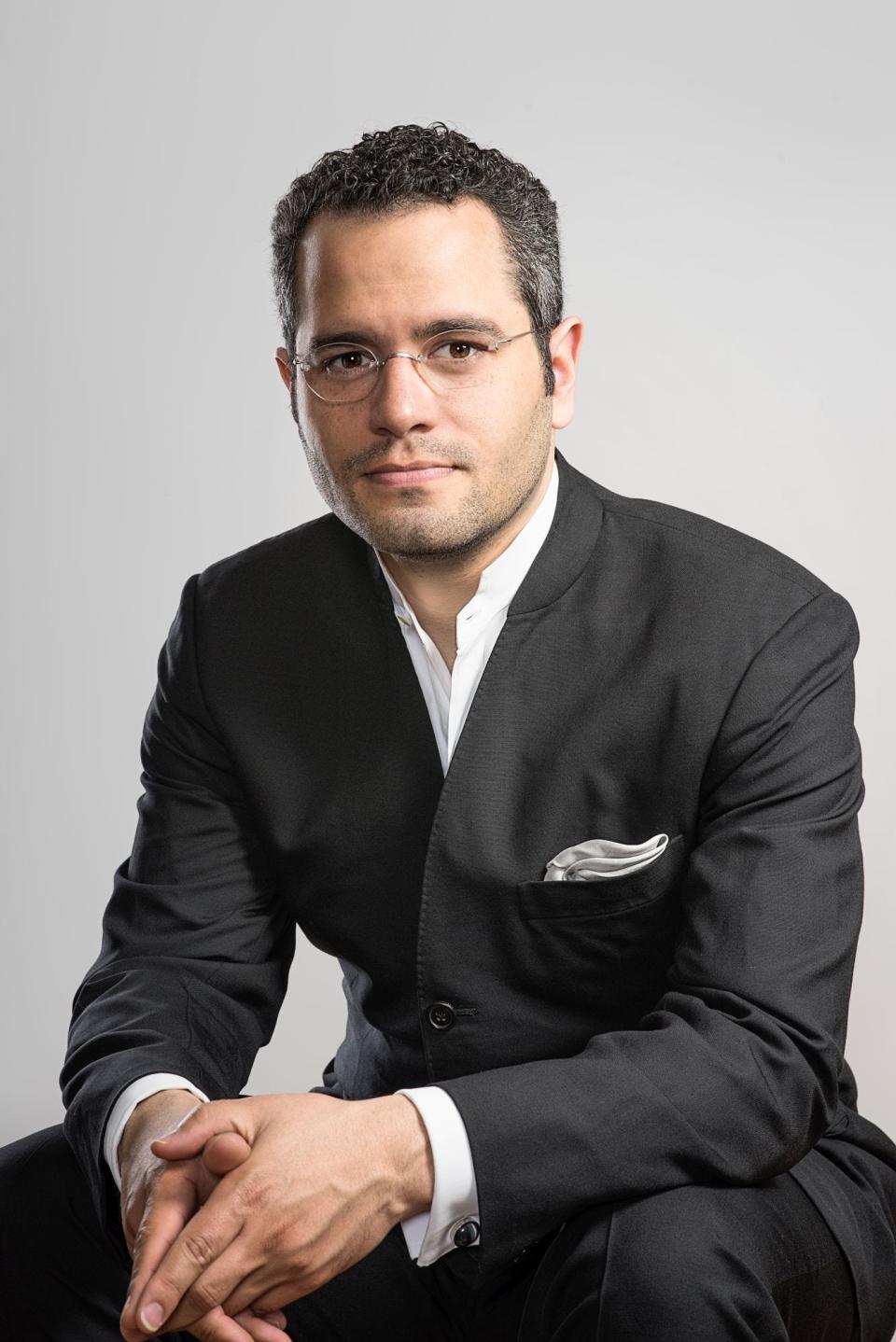Chineke! Orchestra, coming to Mechanics Hall, opens new doors on first North American tour
Internationally acclaimed British double-bass classical musician Chi-chi Nwanoku said she always felt "the odd one out," and not just because she was a five-foot tall woman playing the largest stringed instrument in a classical orchestra.
"I was the only person of color on the stage. I was always alone," Nwanoku said. "I didn't even know I was allowed to talk about it ... I was always the odd one out even though I was working at the highest end of the industry."
Nwanoku is the eldest of five children from Nigerian and Irish parents. She was born in London, lived briefly in Nigeria, and then moved with her family to near Canterbury and then near Reading, both in England.
After years of performing in orchestras and feeling isolated, she had what she calls her "lightbulb moment."

Nwanoku founded The Chineke! Foundation to provide outstanding career opportunities to established and up-and-coming Black, Asian and ethnically diverse classical musicians in the UK and Europe.
Chineke!’s motto is: "Championing change and celebrating diversity in classical music." The foundation oversees the Chineke! Orchestra and the Chineke! Junior Orchestra.
The Chineke! Orchestra, Europe’s first majority-Black and ethnically diverse orchestra, made its debut at London's Southbank Centre in 2015 and achieved immediate recognition.
After a three year delay caused by the pandemic, Chineke! Orchestra is now on its first North American tour consisting of six concerts — two in Canada and four in the United States, including a performance at 7:30 p.m. March 23 in Mechanics Hall, Worcester, presented by Music Worcester.
"Chineke! is thrilled to be able to finally make its North American debut," Nwanoku said. “We’ve been looking forward to this tour for years, and it will be a privilege for us to perform this repertoire for audiences in both Canada and the States. We’re proud of what we’ve created and built with this ensemble and can’t wait to share it beyond Europe."
Sharing their music and message
The orchestra also seeks to perform famous and familiar classical works along with repertoire by composers past and present who have been overlooked. The program for the March 23 concert at Mechanics Hall includes Carlos Simon's Fate Now Conquers; Samuel Coleridge-Taylor's Violin Concerto in G minor, Op. 20 (Soloist: Elena Urioste); and Dvořák's Symphony No. 9 in E minor, Op. 95 (From the New World).
Simon is a contemporary African American composer of Western classical music, while Coleridge-Taylor was a British/Sierra Leonian composer from the late Romantic period. Dvořák conducted on the Mechanics Hall stage in 1893. American conductor Andrew Grams takes the baton March 23.

A small number of musicians from the Chineke! Orchestra did perform a handful of dates in 2019 in the U.S., but "this one is a tour," Nwanoku said of the trip that opened with a concert at the National Arts Centre in Ottawa March 16.
Asked about the significance of the tour during a recent Zoom interview from England before the orchestra departed, Nwanoku , who is also artistic director of the Chineke! Foundation, said "It's such an important tour for the orchestra. Any orchestra worth its salt wants to go on tour and share their message and music."
The schedule also included or includes performances in Toronto March 18, the Lincoln Center in New York City March 20, Jordan Hall in Boston March 22, and the University of Michigan at Ann Arbor March 25.
Worcester was on the original 2020 itinerary. Nwanoku said she's excited that the orchestra is able to come here for this trip. She's heard of Mechanics Hall. "I've heard it's wonderful," she said.
Even with six stops the orchestra's tour is a "big venture," Nwanoku said.
"There's a lot of moving parts to line up, but our message is vital."
America is a destination "we need to get to," in that regard, she said. In the UK and US, "We share similar challenges — inclusion, diversity," she said.
In the aftermath of the George Floyd murder in 2020, she observed that there were demonstrations "in every city across the world" with people of "every nationality," she said.
"It's important that people see our orchestra in action, see how inclusion can work. I think everyone can look at the stage and see themselves represented. It's not just getting more people of color through the door but people of all ages, all social groups. It's an endeavor that truly looks like the world. You don't often see such a group," Nwanoku said.
Tuning out naysayers
Nwanoku was 7 years old when she discovered the piano at a neighbor’s. She returned to their house daily to play until the neighbors got so fed up they wheeled the piano up the road and gave it to her. Meanwhile, she was spotted by an athletics coach and trained as a 100-meter sprinter, eventually competing at the national level.
This career ended abruptly due to a knee injury at age 18, which is when she took up the double bass and actively pursued a career in music. She studied at the Royal Academy of Music in London and with Franco Petracchi in Rome, and soon found herself in demand internationally.
She was a founder member of the Orchestra of the Age of Enlightenment, a period instrument orchestra, and held the position of principal double bass there for 30 years. She is professor of Double Bass Historical Studies at the Royal Academy of Music, where she was made a Fellow in 1998.
Nwanoku has also presented programs for BBC radio and received CBE, OBE and MBE honors for contributions to music and diversity. From 2019 to 2023 she was voted to the Powerlist of Britain’s 100 Most Influential Black People.
Nevertheless, she recalled that in her first term at college, "I was told I would never have a career because I was playing a man's instrument ... If I had listened to all the voices Chineke! wouldn't be here."
"There's so many issues about the color question. We're not there yet. No matter how many good intentions there are, there are still real problems," Nwanoku said.
"They do say that music is a universal language that anyone can appreciate ... Music is the most important kind of nonverbal communication," she said.
However, "Music could be working harder to bring people together if we allowed it to," she said.
Voices were overwhelmingly encouraging after Nwanoku had her "lightbulb moment" about Chineke!, but there were also some words that she remembers and takes as an ongoing challenge.
'The Spirit of Creation'
Ed Vaizey, the government's culture minister at the time, had asked Nwanoku why she was the only classical musician of color on concert stages. That also included off stage as well, behind the scenes and with backroom staff, she said.
Attending a reception with Vaizey (to which she hadn't been invited) for a concert by the visiting Kinshasa Symphony Orchestra in London, she was the only guest who was a person of color. She decided something needed to be done.
The Chineke! Foundation gives Black, Asian and ethnically diverse classical musicians a platform on which to excel, and by such methods increase the representation of Asian, Black and ethnically diverse musicians in British and European orchestras. Chineke! means "the spirit of creation" in Igbo.
"I called all the leaders in the industry, the principals of all the music colleges," Nwanoku said. "'This is what I'm going to do and I will need your support. And I need you to tell me about your alumni, which musicians of color had graduated over 40 years.'
"I had the full spectrum of responses, let's put it that way. Most people were hugely enthusiastic," she said.
"I spoke with the culture minister. Everyone agreed something needed to be done. They all felt happy I felt I was best placed to do it. I was well known already ... I had quite a big profile already. They felt I was best placed."
However, some people also told her, with a sort of horrific nonchalant racism, "You'll never be able to do this — classical music is not your sort of music is it?"
Nwanoku was incredulous and outraged. "(I said) What do you mean — 'Not your kind of music?' You've watched me for 30 years," she said. " 'Not your kind of music' — how do you know that? You can do anything if you give people the opportunity to perform."
She pressed on: "It is my sort of music."
Opening doors
Nwanoku has said "My aim is to create a space where Black and ethnically diverse musicians can walk on stage and know that they belong, in every sense of the word. If even one child feels that their color is getting in the way of their musical ambitions, then I hope to inspire them, give hem a platform, and show them that music, of whatever kind, is for all people. And I want audiences to feel welcome, regardless of ethnicity.”
Jude Kelly, then artistic director of the Southbank Centre, said to her "I'll give you one year to and find your orchestra," Nwanoku recalled.

The task was huge because while there were talented Black, Asian and other minority musicians, they hadn't found representation in orchestras.
"I would follow a lead. Each one led to another one. I realized, not only am I going to create one orchestra I'm going to create a junior orchestra as well. The more I looked, the more I found. It was just extraordinary," Nwanoku said.
Literally 364 days after Kelly had given the orchestra a year to get started, 62 musicians walked on to the stage in 2015. And after that concert, Kelly made Chineke! Orchestra an associate orchestra of the Southbank Centre.
Nwanoku said, "The first concert it was very much people of color. In order to get systematic closure you have to change peoples' perceptions first. The audience could see all these people of color playing Dvořák, Brahms, and, yes, at a very high level. We had to change perceptions."
Two weeks before Chineke! Orchestra's second birthday in 2017, it performed for the first time at at the prestigious Promenade Concerts in London presented by the BBC.
"We became the most viewed concert in the history of the proms," Nwanoku said.
The Chineke! Orchestra currently gives about 40 concerts a year in the UK, and has toured Europe and Australia.
Now it is across the Atlantic.
"I want to open the doors not just for the players but for the composers and audience as well," Nwanoku said.
Chineke! Orchestra — presented by Music Worcester
When: 7:30 p.m. March 23
Where: Mechanics Hall, 321 Main St., Worcester
How much: $39 to $55: students, $17.50; youth (under 18), $7.50; mechanicshall.org
This article originally appeared on Telegram & Gazette: Chineke! Orchestra opens new doors on first North American tour

